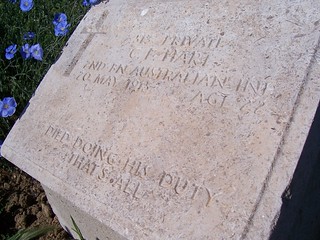In Albury-Wodonga, the weekly free newspapers used to include a column of reflections. They were written by local ministers, or similar (authors included a local Baha’i leader, as well as someone from the local humanist society branch). I don’t know why they stopped. Equally, I don’t know if they achieved anything!
Cleaning up my computer, I found a few of mine. In the interests of recycling, I will re-release them on this blog.
Three weeks ago I had the chance to visit Gallipoli.
It was a centre of activity in preparation for ANZAC Day. There were Turkish voices, Australian accents, temporary seating and police direction (as well as the ubiquitous souvenir sellers!).
It was moving to walk through graveyards with headstones of Australians, New Zealanders, Turks, Indians and other nationalities. It was impossible to imagine how anyone could even land at the narrow beach of ANZAC Cove, let alone climb the steep slopes above.
The visit made me remember what so many have said: the futility of death.I think there’s another force for modern visitors: the futility of life.
We can do heaps: work, family, fun, fly around the world and visit battle fields. These things certainly take our attention. But is there any point? Is there anything that lasts? We all end up precisely like the men whose remains lie scattered about the Gallipoli battlefields.
The Bible is not shy about this feeling of futility. ‘Meaningless, meaningless. All is meaningless’ says the writer of the Bible book Ecclesiastes. (You may have heard it as ‘Vanity of vanities.’)
Another part speaks of creation being ‘subject to futility’ or ‘in bondage to decay.’ Things wear out and look pointless. That includes you and me!
Jesus himself points out what modern physics now also says. Jesus said ‘Heaven and earth will pass away.’ The sun looks permanent. It is only more permanent than us.
But I cut Jesus off. Let’s allow him to complete his sentence. ‘Heaven and earth will pass away but my words will not pass away.’ Jesus’ extraordinary claim is that what he says lasts forever.
He promises forgiveness to those who trust him – this lasts forever. He says no one is too bad for God’s love – this lasts forever. He says he accepts all who come to him – this lasts forever.
Gallipoli is definitely moving. Yet as I left, I could only be more thankful for Jesus and his trusty word.
May 2007

